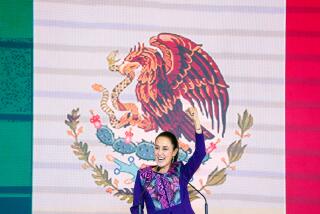Women’s Work: Reconciliation
Suddenly the Third World looks to be more of a woman’s world. First in the Philippines, two years later in Pakistan, early this month in Nicaragua and just last week in Haiti, women have taken the reins of government and the rigors of reform.
Meet former Supreme Court Justice Ertha Pascal-Trouillot, the new provisional president of Haiti, the pivotal figure for an epochal change from military to civilian government. She, in turn, will preside over free elections and will hand over power when a new government is elected.
Consider Corazon Aquino, Violeta Barrios de Chamorro and Benazir Bhutto, three leaders both beloved and imperiled. The parallels among these women are as pointed as they are historic.
Pascal-Trouillot has never held political office before. The other women--two widows of revered reform politicians, one daughter of an executed reform leader--became heads of state within the last five years, without prior electoral experience.
All of their countries are scarred by histories of despotic rule, internecine fury and brutal human-rights abuses. All suffer profound economic problems. Three countries have strong ties to the Catholic Church. All four countries enjoyed--suffered?--strong macho traditions.
The military has been--and is--a major problem for each nation. Since 1986, Aquino has weathered six coup attempts. As she assumes office, Nicaragua’s president-elect Chamorro must pacify two different armies--the well-armed Sandinista force forged by her opposition and the Contra guerrilla force sponsored by the United States. Bhutto is trying to keep her military under civilian rule. Pascal-Trouillot takes over after more than 40 years of oppression by the army, first under the Duvaliers, father and son, then under a couple of generals who were inept, corrupt or both.
One theory of relativity is older than Einstein’s: Only your friends become your enemies; your relatives start that way. Haiti, Nicaragua and the Philippines are places where family feuds often became national crises and where oligarchies, also often family affairs, impeded reform. Pakistan is where civil war and secession have marked a brief 34-year history of nationhood.
That is the terrible challenge facing four brave women: They must reconcile in order to rule. To be exemplary heads of state, they must first be effective heads of families.
More to Read
Sign up for Essential California
The most important California stories and recommendations in your inbox every morning.
You may occasionally receive promotional content from the Los Angeles Times.










